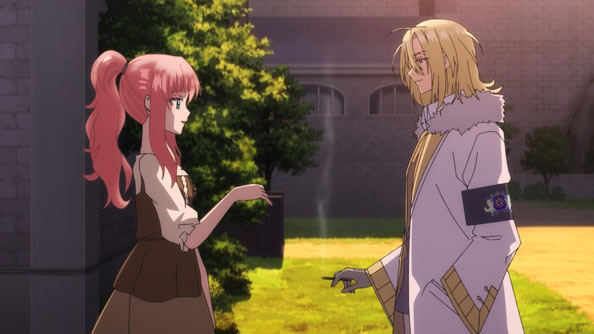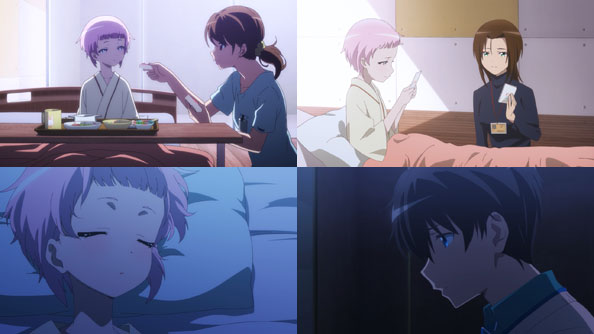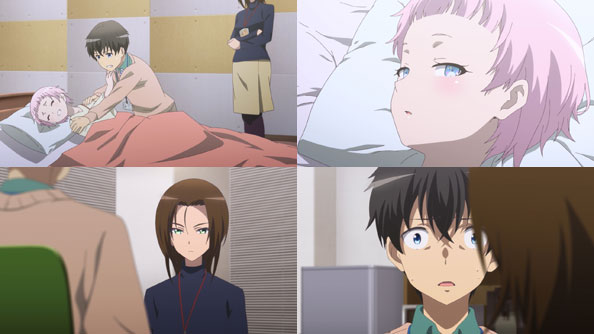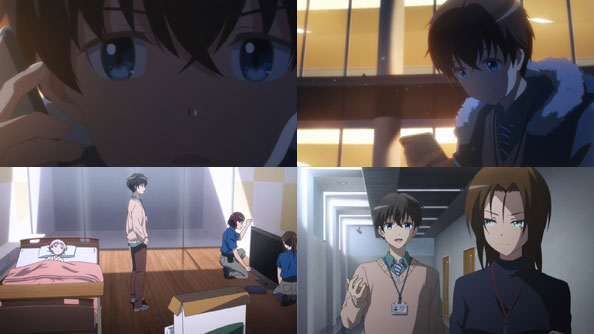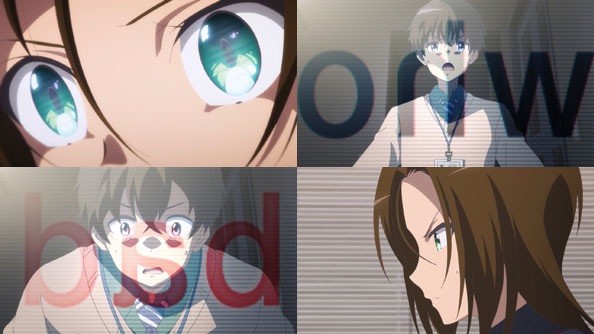
Sayu has a dream about a past night she spent with a man in exchange for a place to stay. She lies under him passively, her eyes devoid of their usual glimmer, making no noise except to say “yeah” when he asks if it feels good. It’s not a love scene; it’s a transaction scene, depicted in all its awkward frankness. Sayu wakes up in her own bed as Yoshida dozes away in his. The glimmer is back in her eyes, but there’s also worry.
When Yoshida heads off to work, all Sayu has are household chores and her thoughts. And her thoughts are constantly asking why Yoshida won’t touch her. Shouldn’t he want to, at least a little? All the other men did, and took what they could. We learn Yoshida turned down a business trip, and his male co-worker assumes it’s because he has a girlfriend.
That prospect upsets Mishima, who asks him out to a movie after work. On the way out he and Gotou nearly walk into each other. Seeing him leave with Mishima, Gotou wears a look I’d describe as…left out?

Long before Yoshida returns home, Sayu is simply out of things to do around the house, so she has nothing but those lingering, worrying thoughts. Even though Yoshida hasn’t touched her like all the other men, she still believes he’ll kick her out when he doesn’t want her anymore.
When he texts her that he’s going out for a movie with a colleague, Sayu decides to stalk him…just a little. She happens to be watching just as Mishima finished talking to Yoshida about fated encounters, both the ones in the sad movie and ones in reality. Mishima is certain it’s better to realize that it’s fate the moment it happens, rather than months or years later.
While Yoshida isn’t 100% with her on this line of thinking (one, because he considers her a co-worker and friend first; two, he’s a bit dense), Mishima thinks she’s having such an encounter with him now, and doesn’t want to let it go. He’s taken aback when she hugs him, but the hug is all Sayu sees when she rushes off.
She doesn’t see Yoshida rebuff Mishima; not that she’s going to give up on him anytime soon. When Yoshida comes home to find Sayu’s phone but no Sayu, his first worry is that she was kidnapped, not that she ran away because she saw him with Mishima.
Even though I knew her running away would be a distinct possibility, I was still hugely relieved to see she didn’t go far; just to a nearby park to think. Heavy on her thoughts is how Yoshida looked when Mishima hugged him, how different it was from how he is with her. It made her jealous, but also reinforces her worry that once a guy as kind as him finds a girlfriend, she’ll be abandoned.

But this episode deals with three fated encounters: Yoshida and Sayu, Yoshida and Mishima…and Sayu and Mishima, who happens to find Sayu in the park looking forlorn (and out of place!) before Yoshida does. She sits with her so she can think without being bothered by a cop, and asks what’s troubling her. She’s not in a fight with her “parents”—i.e. Yoshida—as “they’re unbelievably nice”.
Rather, there’s something Sayu can’t tell “them”, or they might abandon her. Mishima tells her that fear can freeze you in place, but it can also spur forward action. In her book, the latter way is the better one. From what she’s heard, Mishima thinks whoever this is believes in Sayu, so she should believe in them and say This is who I am! This is part of me! Will you stay with me anyway?
Of course, Mishima is speaking from her experiences with Yoshida, who just happens to be the same person Sayu is talking about. Mishima learns this when Yoshida arrives at the park. And from the way he treats Sayu—like a worried-sick guardian would treat his lost kid—it’s clear Sayu and Yoshida have some “family stuff” to discuss. So she takes her leave, but insists that Yoshida explain himself later.
I love how low-key and empathetic Mishima’s reaction is to learning Yoshida is looking after a teenage runaway. She knows she doesn’t have the whole story, and while she very much wants to hear it, it’s not the time or place, so she’ll wait until it is. She doesn’t jump to conclusions or express premature outrage.

When Yoshida and Sayu comes home, Sayu takes Mishima’s advice, stops standing in place, and steps forward … in her black underwear … towards Yoshida. She refuses to dress before they talk. She again mentions how her breasts are big for someone in high school. She presses against Yoshida, and asks again if he wants to have sex her, like all the other men wanted to.
When pressed (literally) by Sayu, Yoshida admits that of course he finds her extremely cute and attractive. Sayu is flattered by his praise, and explains that this is the way she decided on to be able to live without going back home. She knows there are disadvantages to an adult having a teenage girl around, and so thought there must be some kind of advantage way to make up for that.
At first, she hated using her body in that way. But while she was doing it with someone she also felt she could be herself; that she was needed. The advantage she provided to the other men made her feel fulfilled. Maybe in her dream, when she said ‘yeah’ when asked if it felt good, she wasn’t lying. It felt good emotionally for there to be what she saw as a balanced give-and-take; something for something.
But ultimately the disadvantages would win out, and she’d get kicked out. However many times this happened to Sayu, she’s now of the mind that her crushing uneasiness won’t be quelled unless Yoshida sleeps with her. So she asks once more, if it won’t upset him, if he’ll do so. Yoshida gathers Sayu into a solid but thoroughly platonic hug, and make it clear that sleeping with someone he’s not in love with would upset her, so the answer is no.

Once she’s dressed again and they’re seated at the table, Yoshida calmly rejects Sayu’s assertion that she “hasn’t done anything” for him in return to justify keeping her around. Again, he tries to reorient her belief that only sex can pay for the roof under her head and make up for the disadvantages of having her there.
He admits he’s changed since she came. He takes better care of himself. They eat and talk about nothing special. His apartment feels like a real home with her there, and a place he wants to hurry back to after work. Just having her there has made his life more fun and more rewarding. She doesn’t have to do or say anything special to maintain that atmosphere; she just has to be there. That’s it.
Saying this moves Sayu to tears. Yoshida realizes that he wasn’t doing himself or Sayu any favors by thinking he could change her back into a “normal teenage girl”, and that there was nothing more to it than that. Denying her transactional mindset and sexuality only heightened her anxiety about properly paying him back for his kindness.
Acknowledging the role of sex in Sayu’s life up to this point was a crucial step in acknowledging Sayu herself, just as making it clear that sex with her is neither wanted nor required establishes firm boundaries. It sets him apart from all the other men, thank goodness.
Thanks to Mishima, Sayu was able to break their stalemate of unspoken tension, and was able to learn from Yoshida not only why he didn’t want to sleep with her, but why just being there was enough for him. Now that they’ve bared their hearts and cleared the air, they can begin truly living together, like a family. It’s an honest, beautiful, and heartwarming catharsis between two lonely souls who claim to be pathetic, but are actually inspiring!




